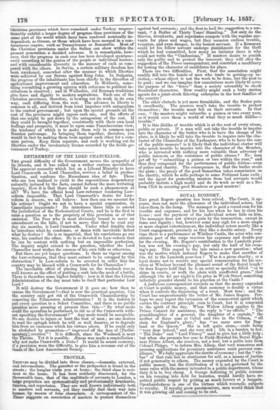RETIREMENT OF THE LORD CHANCELLOR.
THE grand difficulty of the Government moves the sympathy of its ',friends, and it has called up a rather curious speculation. The apparent necessity which lies on a Liberal Ministry to have Lord Cranworth as Lord Chancellor, revives a belief in predestination, and confirms the Mussulman idea of fate. Those who are less inclined to yield to the superstitious despondency naturally induced by the facts, cannot forbear the more irritating inquiry, How it is that there should be such a phenomenon at all? We have the official head Law-reformer rendering Lawreform impossible. That Lord Oranworth's desire for Lawreform is sincere, we all believe: how then can we account for his actions Ought we not to have a special commission, de Cainiellario inquirendo ? He introduces time bills to amend the jurisdiction of the Ecclesiastical Courts, and he is the first to raise a question as to the propriety of this provision or of that omission. The Peer who is most obviously bound to move an amendment on the bills, if not to move that they be read any day six months, is Lord Cranworth. Under what fatality does lie introduce what he condemns, or damn with inevitable defeat what he desires ? He is so impartial, that his convictions go one way, his conduct the other. He is so devoted. to Law-reform that he can be content with nothing but an impossible perfection. The inquiry might extend to the question, whether the Lord Chancellor most wishes the success of his own bills or otherwise.
But there are yet larger questions. Is there ILO vigour among the Law-reformers, that they must submit to be estopped by this obstruction ? Is Law-reform to be arrested in order that the country may be blessed with a Cranworth for its Chancellor ?
The inevitable effdct of placing him on the woolsack was as well known as the effect of putting a cork into the neck of a bottle. There is therefore some higher fatality : how is it that the Liberal Administration of the day must take to itself that particular Law Lord ?
It will destroy the Government if it goes on: how then to rescue the Government ?—that is now the practical question. Can the country only get rid of the Cranworth Chancellorship by removing the Pa.lmerston. Administration ? It is the fashion to put every question to a Select Committee, and there is no public question more pressing at present than this—" By what mode could the operation be performed, to rid us of the Cranworth without upsetting the Government?" Any mode would be acceptable. No one desires to injure or hurt the best of men ; no one desires to read the epitaph which he will so well deserve, or to degrade him from an eminence which his virtues adorn. If he could only be abolished by promotion—" improved off the face of [Parliamentary] creation.'! It is difficult, since the Woolsack is next the Throne. Yet it is possible. 2Eneas was made a constellation: why not make Cranworth a Duke? It would be sound economy, if a provision were the difficulty, to give him a revenue out of the funds of the Law Amendment Society.


























 Previous page
Previous page